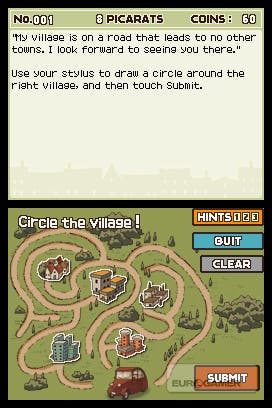The DS' Great Adventure
How Nintendo's handhold has provided a new home for a displaced genre.
Touch Detective and its sequel, Touch Detective 2½, combine rock-solid, item-based, pixel-hunting point-and-click puzzling with a sense of humour and style that is up there with the best on the DS - even the best in the wider genre, actually. Touch Detective comes across as weird-for-the-sake-of-it at first, until you realise that this is genuine, effortless wackiness that takes the piss out of itself just as often as it mocks the player; it's self-referential, irreverent and infused with a knowledge of what makes gamers giggle.
Like any good adventure game, the writing is key to the entertainment, and Touch Detective is unusually well-translated. The games star mini-detective Mackenzie and her pet mushroom, who are together on a quest to become members of the Great Detective Society by solving the mysteries about town. The very first one concerns a hysterical rich girl whose dreams are being stolen for use as a cake ingredient by some dastardly fiend, and it gets odder from there. The bottom screen shows the action; the top displays main character Mackenzie's incidental thoughts and accompanying facial expressions as she wanders off on amusing mental tangents and responds matter-of-factly to unendingly absurd situations - another excellent use for the DS' two screens that really ought to be put to use elsewhere.
The series' weakness is the item puzzling, which is ridiculously obscure. Solutions rarely have much at all to do with logic, in keeping with the rest of the game. But this is an exploration of adventure games, not a review for the general reader, and any gamer with a soft spot for point-and-click will find Touch Detective irresistible, obscure puzzle design and all, and forgive it its design faults.

It's impossible to talk about DS adventure games without raving about Phoenix Wright, of course, which has become something of a defining series for the console. Name me another system that could possibly pull this off, cries of 'Objection!' and all: there simply isn't one, and consequently loveable, funny Phoenix Wright has become the figurehead of this new genre, the DS Adventure. If you're reading this then you'll almost certainly have played it (although it's unlikely that you'll have developed as profound a love for the series as I have for Edgeworth), but it's still worth mentioning: it gives good old text-based storytelling a new format and new life on the DS, and though it's not immediately recognisable as a descendant of the point-and-click adventure, it has all of the central tenets of the genre - storytelling, characterisation, humour and excellent writing - at its heart.
There's a recent new arrival at the DS Adventure party in the form of the lovable Professor Layton and the Curious Village, which further diversifies this burgeoning new genre. No other system could possibly have housed this charming sequence of quaintly old-fashioned puzzles so comfortably; portability is key to its design, and it relies on nothing more than the occasional ten minutes of time to spend on a puzzle and the ability to follow the mild intrigue that drives the plot. Again it distinguishes itself in visual style and the imagination evident in its puzzles; again, it's evidence that the DS does much to inspire the imaginations of adventure developers.
That's the defining element of this new genre, I think - imagination, and a willingness to apply traditional story and puzzle ideas to a new format. The DS hasn't simply provided alternative accommodation for the story- and puzzle-driven adventure, it's redefined it, and given willing developers the opportunity to tell their stories in ever-increasingly engaging and inventive ways.
